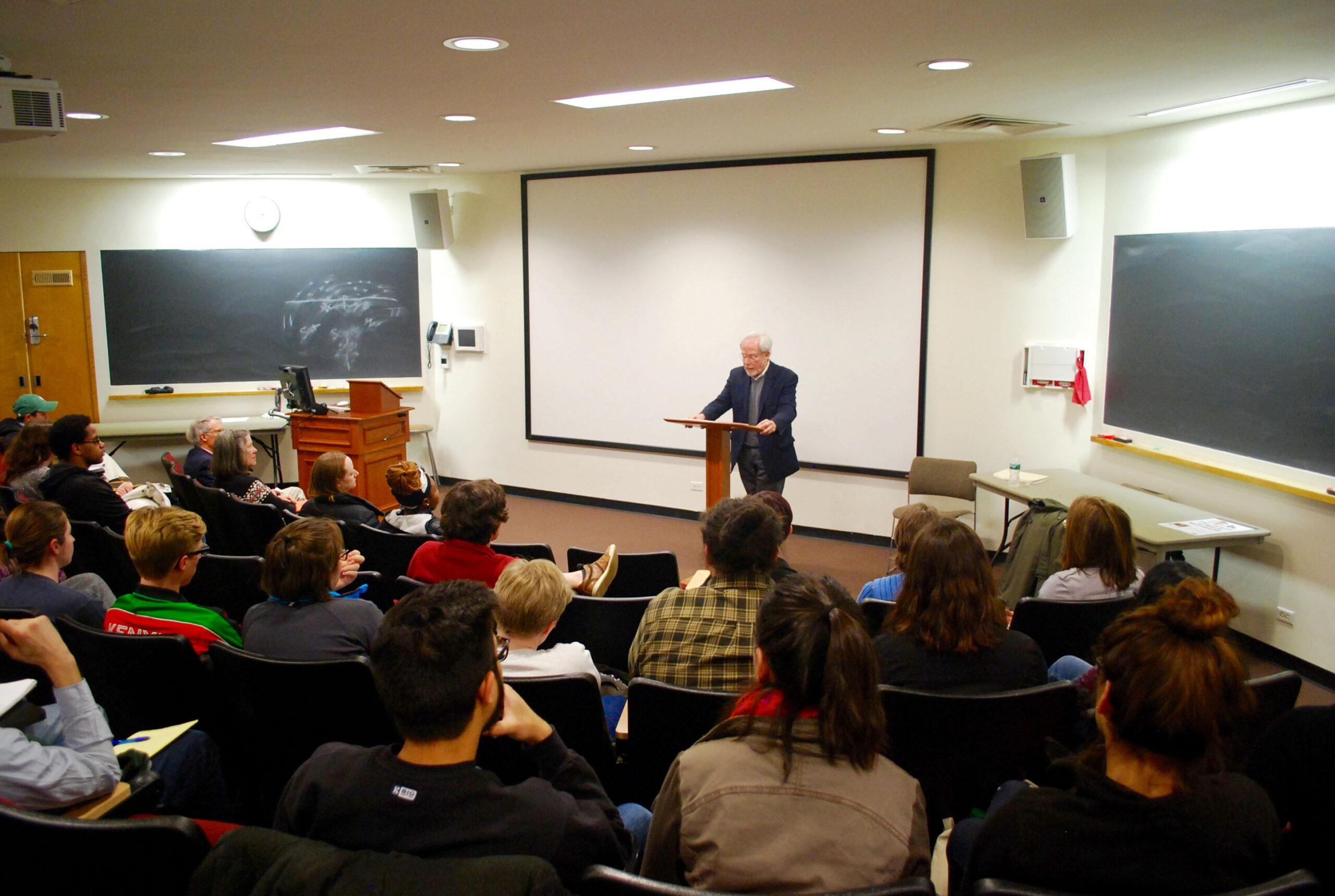Gay minister speaks on evolving interpretations of the Bible
March 31, 2017

Rev. Dr. Marvin M. Ellison, former Willard S. Bass Professor of Christian Ethics at the Bangor Theological Seminary and a Presbyterian minister who is openly gay delivered a talk yesterday afternoon discussing the difficulties of interpreting the Bible and how people should approach issues of homosexuality and religion. The talk, entitled “The Bible and Homosexuality,” was sponsored by the Office of Religious and Spiritual Life and the Resource Center for Sexual and Gender Diversity but was spurred by student interest in the topic, according to Director of Religious and Spiritual Life Bob Ives.
“Many of the individuals I speak to have had difficulties—whether they are gay or straight—with their churches with this particular issue,” said Ives.
After speaking to students who had struggled with the intersection of homosexuality and Christianity, Ives and the Resource Center for Sexual and Gender Diversity invited Ellison to come speak.
“I thought it would be important for [students] to hear someone who is not only gay himself but a professor of theology and ethics his whole life. He speaks about it in a coherent and comprehensible kind of way,” said Ives.
Ellison has been an advocate for gay, lesbian, bisexual and trans persons for more than 20 years. In 1994, he founded the Religious Coalition Against Discrimination in Maine to advocate for and protect those groups. He has also written multiple opinion pieces in the Bangor Daily News arguing for the acceptance of those groups within Christian churches and has spoken on many college campus on the issues of biblical interpretation and Christian ethics. He joined the faculty of the Bangor Theological Seminary in 1981 until the closing of the school in 2013.
At the lecture, Ellison added a subheadline to his talk: “Are we asking the right question?”
“I don’t, for myself, believe there is a very interesting question at all to ask about homosexuality. That would be like asking what the Bible says about blue eyes [or] Chinese food,” Ellison said.
Instead, he focused the talk on Biblical interpretation, stating that the Bible has been used to justify other acts that have since been condemned such as slavery and the oppression of women. He said that the Bible has not changed, rather it is the people interpreting the Bible that have changed. Thus people should be more conscious that the Bible itself does not speak, rather people read the Bible and speak for it.
“Sexual orientation is morally mutual. No one gains extra points for being straight nor does anyone lose points if [they are] gay, lesbian, bisexual or asexual. The moral calculus doesn’t work that way,” he said.
Following a 50-minute lecture, audience members had the opportunity to ask Ellison questions. One person asked if individuals who are Christian and disagree with Ellison’s views of Biblical interpretation can hold true to their faith without being malicious toward people who are homosexual. Ellison responded that this is possible, but difficult because people often believe that communities need to be the same in order to operate.
Another student asked whether people must share an underlying truth in order to engage in the discussion. Ellison acknowledged the difficulties of trying to reach such middle ground but instead encouraged the audience to speak on the issues of Biblical interpretation and putting the Bible in context. Students reacted positively to the talk. A junior who wished to remain anonymous, who identifies as both religious and queer, said that the talk was refreshing.
“It was a more empowering message than I’ve heard from a lot of preachers, and it resonated with me in the sense that I view my religion as very love based and very justice based, and that was the basis of what he was talking about,” he said.
However, he said he feels that the larger campus might not be ready for more religious speakers.
“I don’t know if overall it would be a beneficial thing, but I do like the combination of taking societal concepts and putting it in a religious and biblical context,” he said.
The audience also included members of Queer Christians, an informal group of students who identify as both Christian and queer that grew out of the Resource Center for Sexual and Gender Diversity. Students gather informally to talk about how their various identities intersect.
Meredith Outterson ’17 and Sydney Smith ’19, both members of the group, enjoyed Ellison’s lecture.
“I think it is awesome to have speakers like this who have a different perspective from the one you might hear in broader society and people to just bring a religious lens into different social justice issues,” said Outterson. “For me social justice is a very important part of religion—religion informs my social justice work.”
Smith said she appreciated Ellison’s approach to the topic.
“I really appreciated the scholarly approach to the issue. Especially, the broader conceptual approach to the issue instead of just picking out verses or arguing specifics of what the Bible says,” said Smith. “Examining ourselves rather than the text.”

Comments
Before submitting a comment, please review our comment policy. Some key points from the policy: